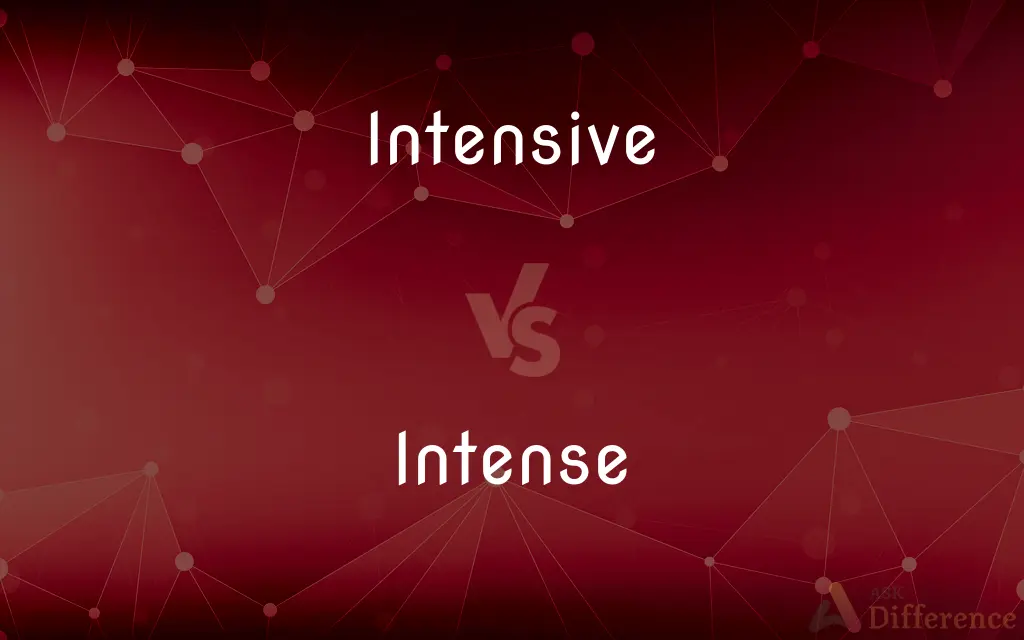Intensive vs. Intense — What's the Difference?
By Tayyaba Rehman — Updated on November 3, 2023
Intensive refers to something thorough and concentrated in application or effect, while intense describes something of extreme force, degree, or strength.

Difference Between Intensive and Intense
Table of Contents
ADVERTISEMENT
Key Differences
Intensive and intense both relate to high degrees of a particular quality, but they are used in different contexts. Intensive is often used to describe activities or processes that are very thorough and concentrated, requiring significant effort or focus in a specific area. For example, an intensive course of study implies a deep and concentrated focus on the subject matter.
Intense, on the other hand, describes the strength or degree of emotion, activity, or a condition. It is more about the power or degree to which something is felt or experienced rather than the depth and thoroughness of an activity. An intense pain, for example, refers to the severe level of discomfort, not the duration or concentration of treatment.
Intensive describes the nature of an effort or operation that is comprehensive and demanding. It focuses more on the method and approach, suggesting that a great deal of energy or resources is dedicated to a particular task. An intensive agricultural practice would involve concentrated efforts on a small area of land.
Intense is about the severity or extremity of a particular state or condition. It is a word that often relates to feelings, sensations, or qualities, such as an intense color, which refers to the vividness or brightness, not how comprehensively the color is applied or studied.
Intensive can be applied to describe things like research, training, or farming, where there is an implication of something being done with a lot of effort, resources, or concentration in a focused manner. Intense is less about the application and more about the level or degree of force, degree, or strength that characterizes a situation, such as an intense storm.
ADVERTISEMENT
Comparison Chart
Focus
Concentrated effort or application.
Extreme degree or strength.
Usage in Grammar
Adjective, often used with nouns.
Adjective, often modifies adverbs.
Context
Frequently relates to methods.
Often describes emotions or states.
Duration
Suggests prolonged effort.
Implies a condition, not duration.
Fields of Use
Education, agriculture, training.
Emotions, experiences, sensations.
Compare with Definitions
Intensive
Involving much activity, effort, or careful attention in a short period
The project was completed after weeks of intensive labor.
Intense
Of extreme force, degree, or strength
The intense heat of the desert can be overwhelming.
Intensive
Designed to deliver fast and powerful results
The clinic offered an intensive detoxification program.
Intense
Having a high degree of intensity or concentration
The artist used intense colors in her painting.
Intensive
Requiring or showing a high concentration of effort
She attended an intensive programming boot camp.
Intense
In an extreme degree; very great
The skater performed with intense concentration.
Intensive
Of, relating to, or characterized by intensity
Intensive training.
Intense
Felt strongly; profound
His intense dislike for the policy was evident.
Intensive
(Grammar) Tending to emphasize or intensify
An intensive adverb.
Intense
Intense is the fifth studio album by Dutch DJ and record producer Armin van Buuren. It was released on 3 May 2013 by Armada Music.The first song announced to be on the album is "Waiting for the Night", featuring the singer Fiora, which was released on 21 January 2013 as the theme song to the Dutch film Loving Ibiza (Verliefd op Ibiza).
Intensive
Possessing or requiring to a high degree. Often used in combination
Labor-intensive.
Intense
Possessing or displaying a distinctive feature to an extreme degree
The intense sun of the tropics.
Intensive
Of or relating to agricultural production that achieves high yields per acre of land but requires significant input of labor or materials.
Intense
Extreme in degree, strength, or size
Intense heat.
Intensive
(Physics) Having the same value for any subdivision of a thermodynamic system
Intensive pressure.
Intense
Involving or showing strain or extreme effort
Intense concentration.
Intensive
A linguistic element, such as the adverb extremely or awfully, that provides force or emphasis. Also called intensifier.
Intense
Deeply felt; profound
Intense anger.
Intensive
Thorough; to a great degree; with intensity.
Intense
Having or showing strong feeling or great seriousness
An intense writer.
Intensive
Demanding; requiring a great amount of work etc.
This job is difficult because it is so labour-intensive.
Intense
Strained; tightly drawn.
Intensive
Highly concentrated.
I took a three-day intensive course in finance.
Intense
Strict, very close or earnest.
Intense study;
Intense thought
Intensive
(obsolete) Stretched; allowing intension, or increase of degree; that can be intensified.
Intense
Extreme in degree; excessive.
Intensive
Characterized by persistence; intent; assiduous.
Intense
Extreme in size or strength.
Intensive
(grammar) Serving to give force or emphasis.
An intensive verb or preposition
Intense
Stressful and tiring.
Intensive
(medicine) Related to the need to manage life-threatening conditions by means of sophisticated life support and monitoring.
She was moved to the intensive-care unit of the hospital.
Intense
Very severe.
Intensive
(linguistics) A form of a word with a stronger or more forceful sense than the root on which the intensive is built.
Intense
Very emotional or passionate.
The artist was a small, intense man with piercing blue eyes.
Intensive
A course taught intensively.
Intense
Strained; tightly drawn; kept on the stretch; strict; very close or earnest; as, intense study or application; intense thought.
Intensive
Stretched; admitting of intension, or increase of degree; that can be intensified.
Intense
Extreme in degree; excessive; immoderate;
In this intense seclusion of the forest.
Intensive
Characterized by persistence; intent; unremitted; assiduous; intense.
Intense
In an extreme degree;
Intense heat
Intense anxiety
Intense desire
Intense emotion
The skunk's intense acrid odor
Intense pain
Enemy fire was intense
Intensive
Serving to give force or emphasis; as, an intensive verb or preposition.
Intense
Extremely sharp or intense;
Acute pain
Felt acute annoyance
Intense itching and burning
Intensive
Designating, or pertaining to, any system of farming or horticulture, usually practiced on small pieces of land, in which the soil is thoroughly worked and fertilized so as to get as much return as possible; - opposed to extensive.
Intense
(of color) having the highest saturation;
Vivid green
Intense blue
Intensive
That which intensifies or emphasizes; an intensive verb or word.
Intense
Very passionate, emotional, or deep
She felt an intense connection to the song.
Intensive
A modifier that has little meaning except to intensify the meaning it modifies;
`up' in `finished up' is an intensifier
`honestly' in `I honestly don't know' is an intensifier
Intensive
Characterized by a high degree or intensity; often used as a combining form;
The questioning was intensive
Intensive care
Research-intensive
A labor-intensive industry
Intensive
Tending to give force or emphasis;
An intensive adverb
Intensive
Of agriculture; intended to increase productivity of a fixed area by expending more capital and labor;
Intensive agriculture
Intensive conditions
Intensive
Concentrated on a single area or subject
The intensive language course improved my Spanish in two weeks.
Intensive
Very thorough and exhaustive
The intensive study of classical music requires deep dedication.
Common Curiosities
Is intensive always related to work or study?
Often, but not always; it can refer to any concentrated effort in various contexts.
What does intensive mean?
Intensive means something is done with a lot of effort, focus, or thoroughness in a particular area.
Can intensive and intense be used interchangeably?
No, because intensive refers to the concentrated application, while intense refers to the strength or degree.
How does intense relate to senses?
Intense can describe sensory experiences that are strong and powerful, like a bright light or a loud sound.
What is an example of an intensive activity?
An intensive activity is something like an immersive language learning program.
Can a person be described as intense?
Yes, describing someone as intense suggests they have a strong presence, powerful emotions, or passionate behaviors.
What does it mean when a feeling is described as intense?
An intense feeling is one that is felt very deeply or with great strength.
Could an experience be both intensive and intense?
Yes, an experience could be both, like an intensive and intense workout.
Can emotions be intensive?
Emotions are typically described as intense, not intensive.
What’s the difference in using intensive and intense in writing?
Intensive should be used when discussing a concentrated method, whereas intense describes a powerful quality or degree.
What is an intensive course?
An intensive course is a compressed and rigorous program of study that covers a lot of material in a short time.
Can weather be described as intensive?
No, weather would be described as intense if it's very severe or harsh.
Is "intensely" the adverb form of both intensive and intense?
No, it's the adverb form of intense. Intensive does not commonly have an adverb form.
What’s an example of intensive farming?
Intensive farming involves concentrated agricultural production in a confined area.
How do you determine whether to use intensive or intense?
Determine if you're describing the concentration of an action (intensive) or the strength of a sensation or emotion (intense).
Share Your Discovery

Previous Comparison
Vocational vs. Professional
Next Comparison
Toucan vs. HornbillAuthor Spotlight
Written by
Tayyaba RehmanTayyaba Rehman is a distinguished writer, currently serving as a primary contributor to askdifference.com. As a researcher in semantics and etymology, Tayyaba's passion for the complexity of languages and their distinctions has found a perfect home on the platform. Tayyaba delves into the intricacies of language, distinguishing between commonly confused words and phrases, thereby providing clarity for readers worldwide.














































